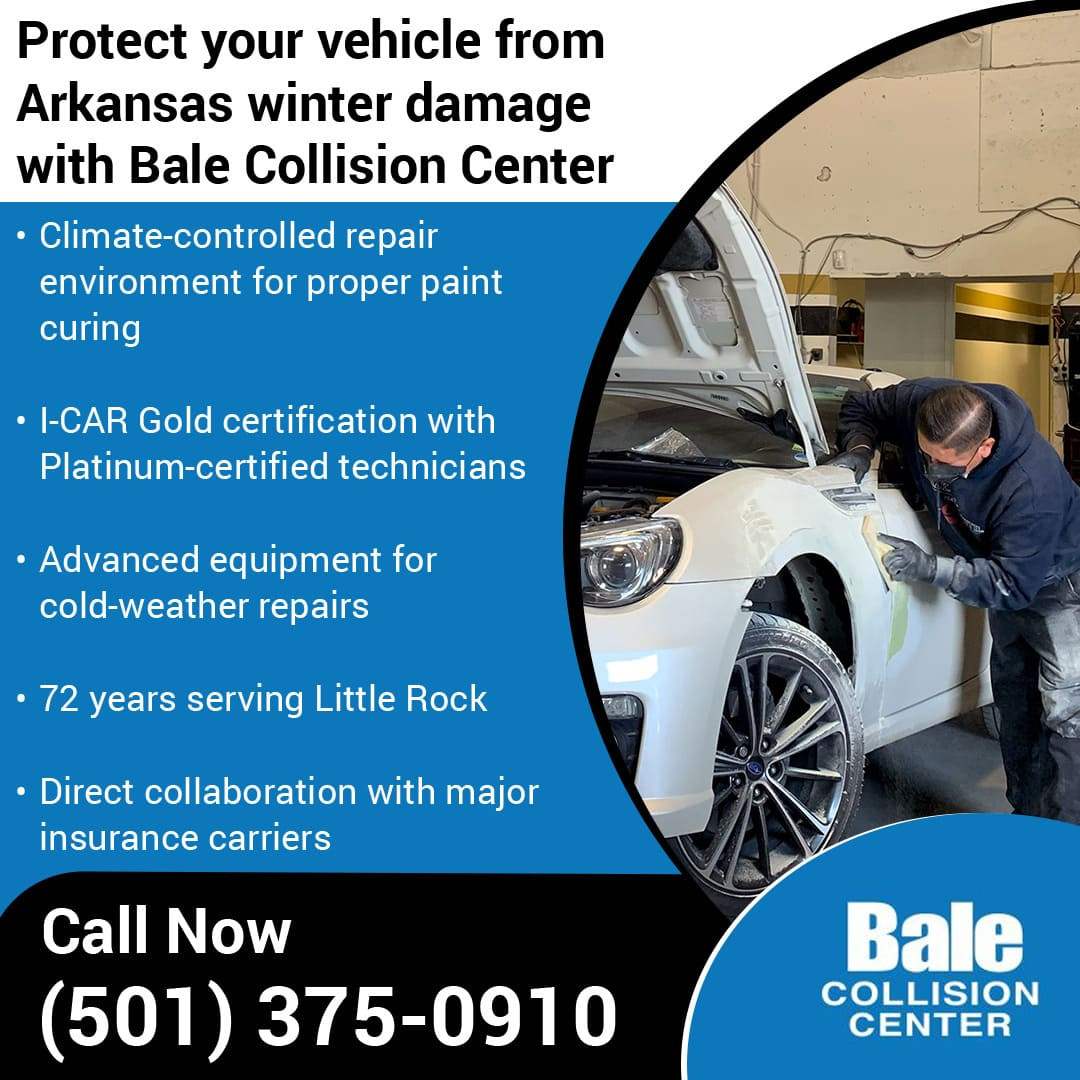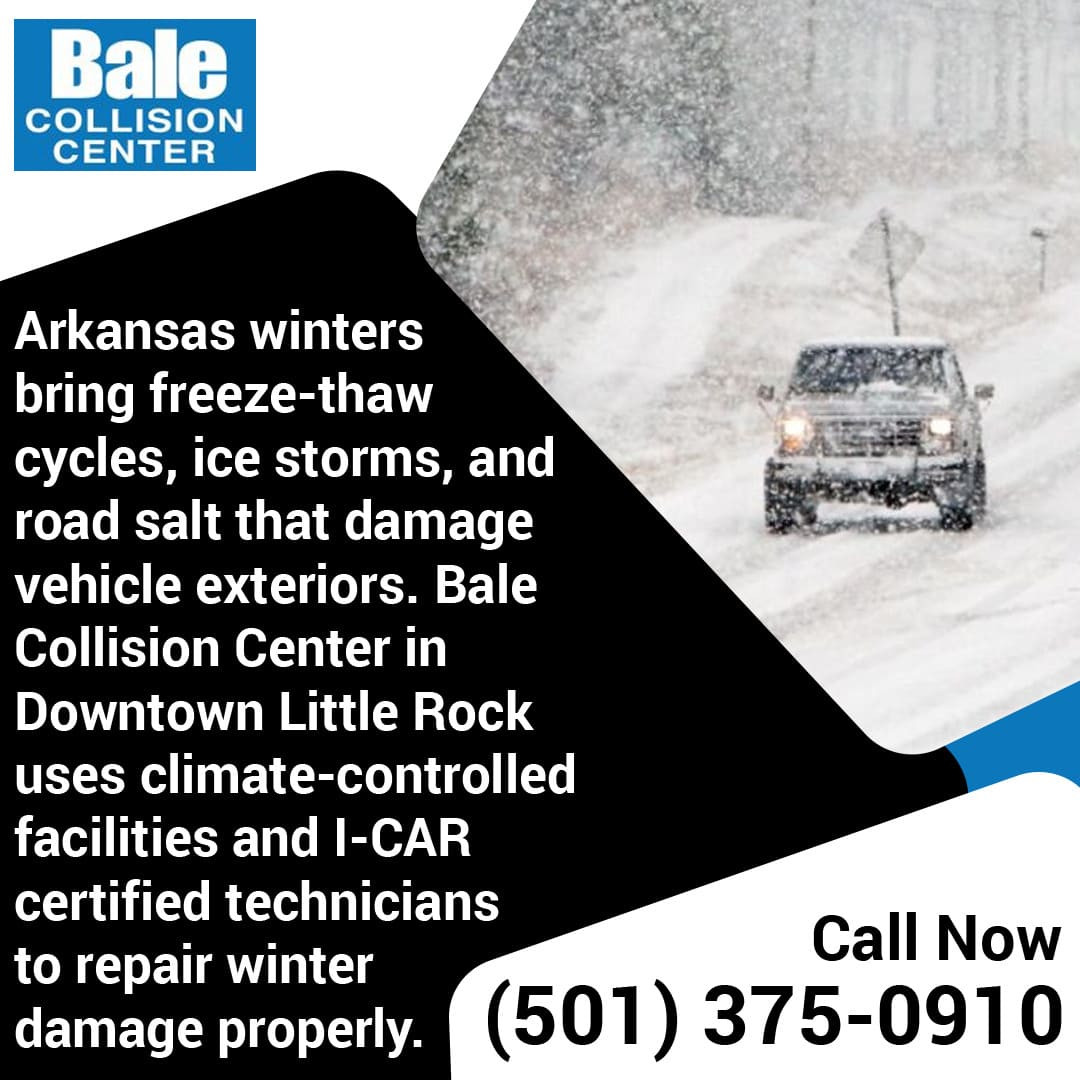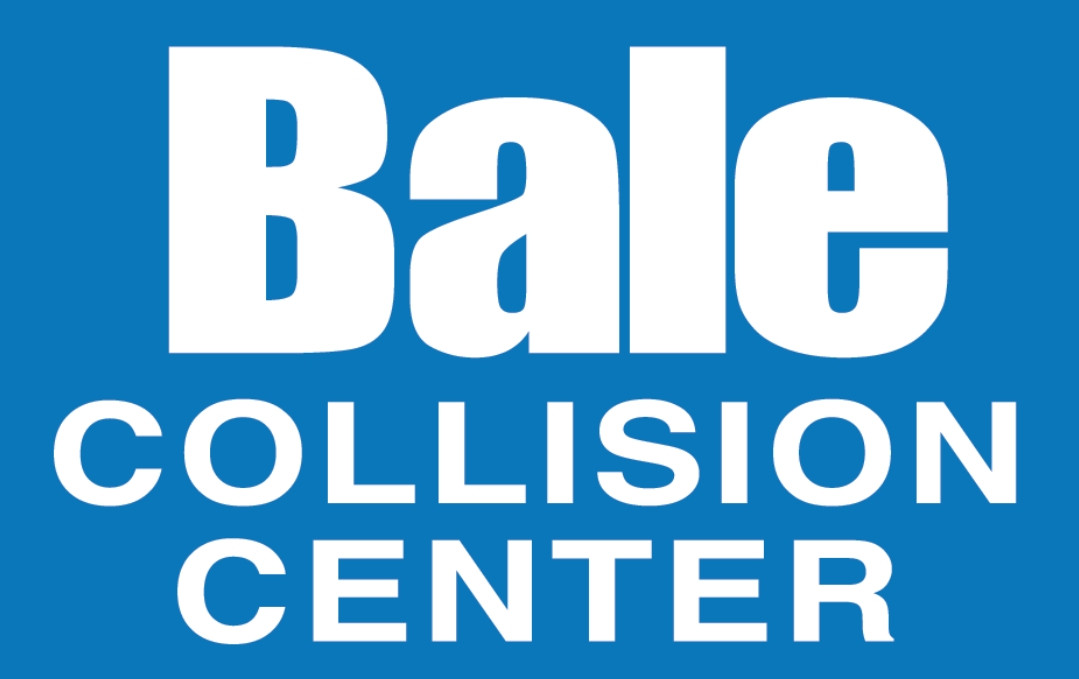Little Rock, AR - Arkansas’s volatile winter weather creates unique auto body repair challenges. As the cold season approaches, Little Rock vehicle owners face a mix of ice storms, freeze-thaw cycles, and road treatments that can cause rapid exterior damage. Bale Collision Center (Downtown) in Little Rock, AR, brings 72 years of experience and industry certification to address these seasonal concerns with precision and professionalism.
Winter Weather Patterns and Auto Body Damage in Arkansas
Unlike northern states that experience consistent cold, Central Arkansas winters fluctuate between freezing temperatures and mild afternoons. This shift creates a destructive freeze-thaw cycle that damages vehicle paint and metal. Ice storms frequently coat vehicles in up to three-quarters of an inch of ice, leading to dents, paint damage, and structural stress.
Moisture trapped in paint chips freezes overnight, expanding cracks and allowing further damage with each cycle. Black ice and road salt also increase accident rates and corrosion, putting added stress on vehicle exteriors and components.
Common Repair Challenges During Arkansas Winters
Winter in Arkansas poses several threats to vehicle surfaces and structural integrity. Even seemingly minor issues can worsen quickly due to weather conditions, making professional car body repair essential.
Ice Removal Damage
Thick ice layers often form on parked vehicles during winter storms. Attempting to remove ice with scrapers, shovels, or other rigid tools frequently causes paint scratches, gouges, or chips. Plastic trim pieces become brittle in the cold and can crack or snap under pressure. What starts as an attempt to clear off ice can leave lasting marks that require professional refinishing or component replacement.
Salt Corrosion
Arkansas uses de-icing chemicals and salt treatments on bridges and highways to prevent freezing. While effective for road safety, these substances pose a serious threat to vehicles. Salt accumulates in wheel wells, undercarriages, and along door seams, creating ideal conditions for corrosion. When left untreated, rust can form beneath paint layers in as little as 48 hours. These corrosive effects are accelerated by the region’s humidity, often resulting in widespread damage that compromises structural integrity and vehicle value.
Freeze-Thaw Expansion Damage
Frequent temperature swings between day and night lead to repeated expansion and contraction in both paint and metal. Water that seeps into small chips or cracks freezes overnight, expands, and widens the damage. This cycle repeats with each cold snap, worsening the extent of the problem. Over time, even small imperfections become significant entry points for moisture and salt, accelerating the deterioration process.
Collision Damage from Icy Roads
Slick roads caused by black ice or sleet increase the likelihood of minor accidents. Many of these collisions may seem superficial but often conceal hidden structural damage. Underlying issues like frame misalignment, bent suspension components, or impact to safety-critical zones go unnoticed without professional assessment.
Material Behavior in Cold Temperatures
Cold weather affects how automotive materials respond during repairs. Paints, adhesives, and sealants require specific temperature conditions to perform correctly. When paint is applied below 55°F, it may not cure properly, leading to peeling, cracking, or surface imperfections such as orange peel texture. Metal also becomes more rigid in low temperatures, which can increase the risk of cracking during dent repair if it is not preheated. For these reasons, using a temperature-controlled environment is necessary to achieve safe and long-lasting auto body repair results.
The Importance of Certified Auto Body Repair in Cold Conditions
Winter weather magnifies the need for advanced equipment and trained professionals. Bale Collision Center holds I-CAR Gold certification and employs I-CAR Platinum and ASE-certified technicians trained in climate-sensitive repair methods. Their auto body shop uses heated paint booths, panel warming systems, and precision frame measurement tools that allow accurate repairs despite temperature fluctuations.
What Sets Bale Collision Center Apart
- 72 years serving the Little Rock community
- Centrally located in Downtown Little Rock for easy access
- Advanced technology for cold-weather repair reliability
- Direct collaboration with all major insurance carriers
- Transparent communication and regular progress updates for customers during repairs
Protect Vehicle Value with Timely Car Body Repair
Leaving winter damage untreated reduces resale value and jeopardizes long-term safety. Bare metal rusts within 48 hours of salt exposure, and rust continues to spread under surrounding paint. Choosing a certified auto body repair shop ensures repairs are done correctly, preserving both the appearance and integrity of the vehicle.
Bale Collision Center’s Downtown Little Rock facility is uniquely equipped to handle the full range of winter-related auto body repair challenges. From minor dents to major collision restoration, their team delivers certified car body repair that restores factory specifications and peace of mind.
Schedule a Winter Damage Assessment Today
Vehicle owners in Little Rock and surrounding communities are encouraged to schedule a winter damage inspection before the season worsens. Early repairs prevent long-term damage and protect vehicle value throughout the winter months. Contact Bale Collision Center at (501) 375-0910 or [email protected] to book an appointment or learn more about their Downtown Little Rock auto body services.





